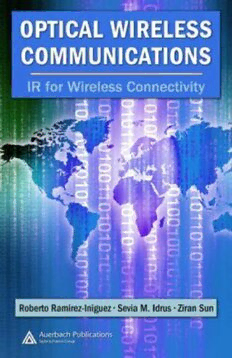Download Optical Wireless Communications: IR for Wireless Connectivity PDF Free - Full Version
Download Optical Wireless Communications: IR for Wireless Connectivity by Roberto Ramirez-Iniguez, Sevia M. Idrus, Ziran Sun in PDF format completely FREE. No registration required, no payment needed. Get instant access to this valuable resource on PDFdrive.to!
About Optical Wireless Communications: IR for Wireless Connectivity
Over the last three decades, interest in Infrared (IR) technology as a medium to convey information has grown considerably. This is reflected by the increasing number of devices such as laptops, PDAs, and mobile phones that incorporate optical wireless transceivers and also by the increasing number of optical wireless links available for indoor and outdoor use. The popularity of IR is based on the advantages it has over radio including unregulated bandwidth, immunity to radio interference, and inherent security. Optical Wireless Communications examines some of the most important features of optical wireless communication systems. It considers the benefits and limitations of IR as a medium conveying information wirelessly and compares the advantages and disadvantages of infrared to microwave and other radio systems. It also details the evolution of IR communication systems and describes atmospheric and other types of data transmission limitations. The book presents design fundamentals of optical concentrators, as well as a review of some of the most important receiver optical front-ends (containing imaging or non-imaging concentrators and optical filters), including an explanation of the different sources of infrared noise and an introduction to eye safety. It also describes optical wireless transmitter and receiver design issues, typical modulation, coding, and multiple access techniques, and introduces IrDA protocols and wireless IR networking.
Detailed Information
| Author: | Roberto Ramirez-Iniguez, Sevia M. Idrus, Ziran Sun |
|---|---|
| Publication Year: | 2008 |
| ISBN: | 9781420013443 |
| Pages: | 378 |
| Language: | English |
| File Size: | 8.817 |
| Format: | |
| Price: | FREE |
Safe & Secure Download - No registration required
Why Choose PDFdrive for Your Free Optical Wireless Communications: IR for Wireless Connectivity Download?
- 100% Free: No hidden fees or subscriptions required for one book every day.
- No Registration: Immediate access is available without creating accounts for one book every day.
- Safe and Secure: Clean downloads without malware or viruses
- Multiple Formats: PDF, MOBI, Mpub,... optimized for all devices
- Educational Resource: Supporting knowledge sharing and learning
Frequently Asked Questions
Is it really free to download Optical Wireless Communications: IR for Wireless Connectivity PDF?
Yes, on https://PDFdrive.to you can download Optical Wireless Communications: IR for Wireless Connectivity by Roberto Ramirez-Iniguez, Sevia M. Idrus, Ziran Sun completely free. We don't require any payment, subscription, or registration to access this PDF file. For 3 books every day.
How can I read Optical Wireless Communications: IR for Wireless Connectivity on my mobile device?
After downloading Optical Wireless Communications: IR for Wireless Connectivity PDF, you can open it with any PDF reader app on your phone or tablet. We recommend using Adobe Acrobat Reader, Apple Books, or Google Play Books for the best reading experience.
Is this the full version of Optical Wireless Communications: IR for Wireless Connectivity?
Yes, this is the complete PDF version of Optical Wireless Communications: IR for Wireless Connectivity by Roberto Ramirez-Iniguez, Sevia M. Idrus, Ziran Sun. You will be able to read the entire content as in the printed version without missing any pages.
Is it legal to download Optical Wireless Communications: IR for Wireless Connectivity PDF for free?
https://PDFdrive.to provides links to free educational resources available online. We do not store any files on our servers. Please be aware of copyright laws in your country before downloading.
The materials shared are intended for research, educational, and personal use in accordance with fair use principles.

